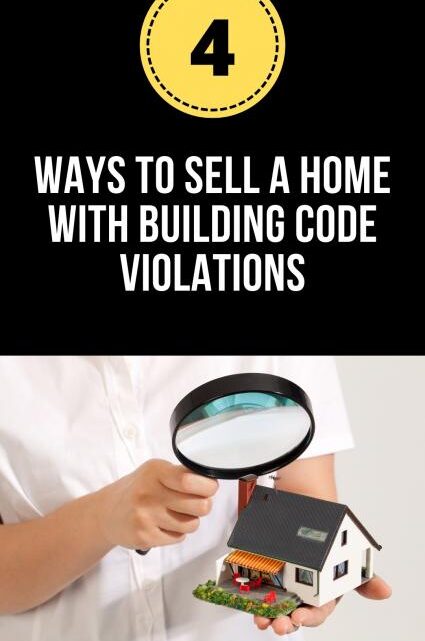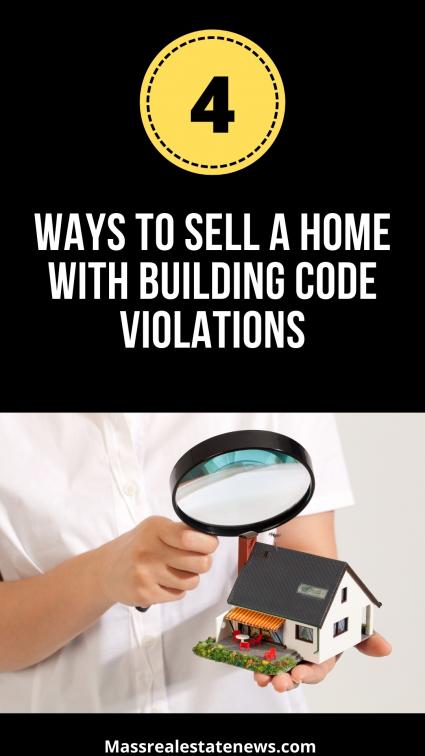What to Know About Selling a Home With Code Violations
Do you suspect you may have some building code violations at your home? Historic homes and even more recent homes that haven’t been updated in a while can easily fall out of sync with the most up-to-date local and national building codes. You may figure out when speaking with your trusted real estate agent for instance, that there are code violations standing in the way of your home’s sale.
The closing process could be interrupted for the buyer if there are significant issues discovered causing a delay in the time to close. Luckily, knowledge is power, and when you know that you want to sell a home quickly, you can still move forward confidently when you have a good idea of what your home’s state of repair is.
A great real estate agent can be particularly helpful for understanding the best strategy moving forward. Let’s take a look at some of the things to know about selling a house with code violations.
Disclose Upfront
One of the first problems a lot of sellers encounter is the possibility of hiding code violations during the sale process. After all, if the inspector doesn’t notice or note them for the buyer, the sellers figure they’ve successfully made a sale.
Here in Massachusetts though, it’s important to share all information that could affect a buyer’s purchase decision when you know it through a disclosure. Not only can it create legal ramifications if you don’t disclose, but it also erodes trust that is sorely needed for such a big commitment between buyer and seller.
Therefore, if you happen to already know that there are code violations in your home, you’ll want to create a disclosure of all that you have discovered. When you purchased the house, for instance, you might have heard about a couple of parts of the home that aren’t up to code, or you could have had someone do work on the house and found out from them.
It can sometimes be worthwhile to have an independent inspection to evaluate if there are other harder-to-identify code violations, just so you have a complete picture of the home you are working to sell.
No one feels particularly confident handing over a huge list of code violations to someone who was excited to purchase their house. For that reason, you can make a different decision: for any code violations that are easy to fix, just go ahead and make the change before listing!
Smoke Alarms Are Crucial
For instance, the location of fire/smoke alarms is quite precisely dictated in a lot of local building codes, so if you realize you’d have to disclose incorrectly-located alarms, just make the move so that you no longer are in violation of that code.
The cost-benefit analysis can take some time, so make sure that you make these decisions before you get the listing up and running. It doesn’t have to take forever though – even when you want to sell quickly, you can go ahead and get some repairs scheduled to keep disclosure lists short.
Still, even if the list is lengthy, trust that people make better decisions if they have all the information. You also keep them from having grounds to sue you or cancel the purchase, which can be consequences if you hide code violations.
Price For Success
Going along with the disclosure, you’ll need to be honest with yourself about what the market will bear when it comes to a home with code violations. For minor violations in a strong seller’s market, you may be able to command a high offer just because people are clamoring for homes. However, during a market more favorable for buyers, you’ll want to choose a price level that reflects those violations, so that potential buyers know that they are getting a bargain in exchange for taking on any needed repairs.
Your real estate agent is your best resource when it comes to pricing your home, not only because they have likely sold homes with similar code violations before. They also monitor the listings constantly, trying to understand how the market is moving and what features are likely to impress buyers and prompt an offer.
While you may come into the process with a number in mind, if you discover things like code violations, make sure you’re also considering your real estate agent’s perspective if you want to move that home fast.
Make a Plan to Handle Repairs
While your potential buyers may agree to buy the house as-is and handle any needed repairs themselves, you don’t want to count on that. One way to grease the gears of a real estate transaction with code violations is to research and get quotes ahead of time for making the needed repairs.
No one wants to have to quickly get and compare quotes when a buyer says they are making their offer contingent on those repairs. Instead, give yourself space and time to find reputable workers and good prices; you still don’t have to officially contract with them until a buyer makes their decision about potential repairs.
This means going line-by-line for your disclosed repair needs and talking to trusted professionals. If they offer free estimates, it’s worthwhile to get an estimate in writing. This can both avoid the time and hassle of having to take that step quickly later on, but it also shows your buyer that you’ve done your homework if they ask for a good feel for the potential costs of repairing code violations.
The last thing you’ll want is to have the closing time frame delayed because of code violations.
Market the House as a Fixer-Upper, if Needed
Not every home is destined to be bought by an owner-occupant who wants move-in-ready ease. There’s a wide variety of buyers out there, from house flippers and wholesalers to people who are looking to put in a little TLC before creating a rental property.
If you know that the code violations are likely to make many owner-occupant shoppers balk, you can work with your real estate agent to get your listing in front of those who are already planning on doing some work on the homes they buy. This way, you don’t waste a lot of time marketing the house to those who won’t be impressed with it in its current state. Instead, find the buyer who will see the property’s potential in spite of violations.
Remember that a code violation is most relevant if someone is immediately moving into the space: for instance, a violation like having a bathroom vent improperly into the attic instead of out of the house doesn’t matter so much if the buyer plans on gutting that bathroom anyway. While you’ll still want a complete disclosure list, you may discover that house flippers and other buyers don’t see a problem with particular code violations at all.
Key Takeaways: You Can Sell a House With Code Violations
Hearing “code violations” may sound scary at first, but rest assured that you have options for selling your home quickly. If the code violations aren’t the sort that tends to affect the safety of the home in a big way, your prospective buyers may not find them problematic at all.
Even if major repairs are needed, you’ll have the options of making the repairs, reducing your price, or selling to a buyer who is already interested in doing some work on the house. Your best resources include talking to an inspector who can help you avoid surprises later in the process and your trusted real estate agent, who will have insight into how these code issues tend to affect purchases in this market and in your neighborhood.
Hopefully, you now have a better understanding of how to sell a house with a code violation.
About the author: The above article on selling a house with code violations was written by the Homelight team. HomeLight provides helpful advice to buyers and sellers to make smart real estate decisions.











No Comment